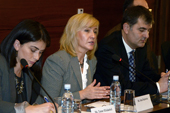
Alternative monitoring aims to reduce ill treatment in Georgian prisons
By Etuna Tsotniashvili
Monday, November 12
On Friday, the Ministry of Corrections and Legal Assistance of Georgia, with assistance from the United Nations Development Programme (UNDP), launched a discussion on effective mechanisms for monitoring the human rights situation in Georgian prisons. The public defender of Georgia has been the only institution since 2007 to implement public oversight over the prisons. Alternative monitoring can ensure more effective protection of human rights and prevent torture and ill-treatment.
The meeting brought together representatives of the government, civil society and international organizations at the Radisson Blu Iveria Hotel.
The discussion was opened by Minister Sozar Subari who has emphasized the necessity of public monitoring in the penitentiary systems and welcomed all interested organizations who want to make their contribution in making the system healthier.
“Public monitoring is a major guarantee in mitigating cases of ill treatment in the penitentiary systems,” the prison minister said. “We are determined to establish a system of prisons where human rights abuse can never happen again. Public oversight is one of the best ways to achieve that,” Subari said, adding that a new alternative monitoring mission will be in full compliance with international standards.
UNDP supports the discussion of improving the penitentiary systems in Georgia. At the meeting, Deputy Head of the UNDP in Georgia, Inita Paulovica, said that the issue of ill treatment of prisoners came out very loudly this autumn before the elections and at that moment everyone recognized that the current system was not sufficient in preventing the mistreatment of prisoners in prisons. That is why Paulovica says, the UN family is happy to support the discussions on the kinds of mechanisms that should be in place in order to stabilize the situation and prevent any kind of bad things happening in prisons.
“Effective correctional oversight can prevent problems, guide decision-makers and enhance the legitimacy of the prison system in the eyes of the public. The UNDP stands ready to continue working with the Ministry and civil society in creating practical solutions in this area,” Paulovica said.
Commenting to The Messenger, the Deputy Head of the UNDP highlighted the alternative monitoring bodies that will be responsible for making clear the current conditions in the prisons. According to her, the body members should be very attentively selected and should be trusted among the prisoners, as well as those among civil society.
“It is not just someone going and seeing what is happening in the prisons, but it is really a legal role of informing public. If there are alternative mechanisms in place in conjunction with the current mechanisms in place by the state, there will be more trust in the penitentiary system,” she said.
One of the models offered at the meeting was prepared by the Penal Reform International regional office.
According to PRI’s model, this body should be fully independent, impartial, fair and transparent. The duty of the monitoring mission will be the monitoring of the penitentiary system and to reveal any cases of mistreatment that occur within the system. Monitoring body should have a right to carry out monitoring without any obstacles at any time without preliminary notification. It should have an opportunity to have conversation with prisoners, prison staff and officials. The organ should have an opportunity present recommendations and reports, also to have public presentations about the situation in the system.
A minimum 25 people should be included in the council and those people will be mainly representatives of human rights organizations. In addition, the PRI model considers dividing members into specialty groups, e.g. those working on children’s rights will be assigned to monitor juvenile inmates.
Discussions regarding the alternative monitoring of the prison system in Georgia will continue at future meetings.

